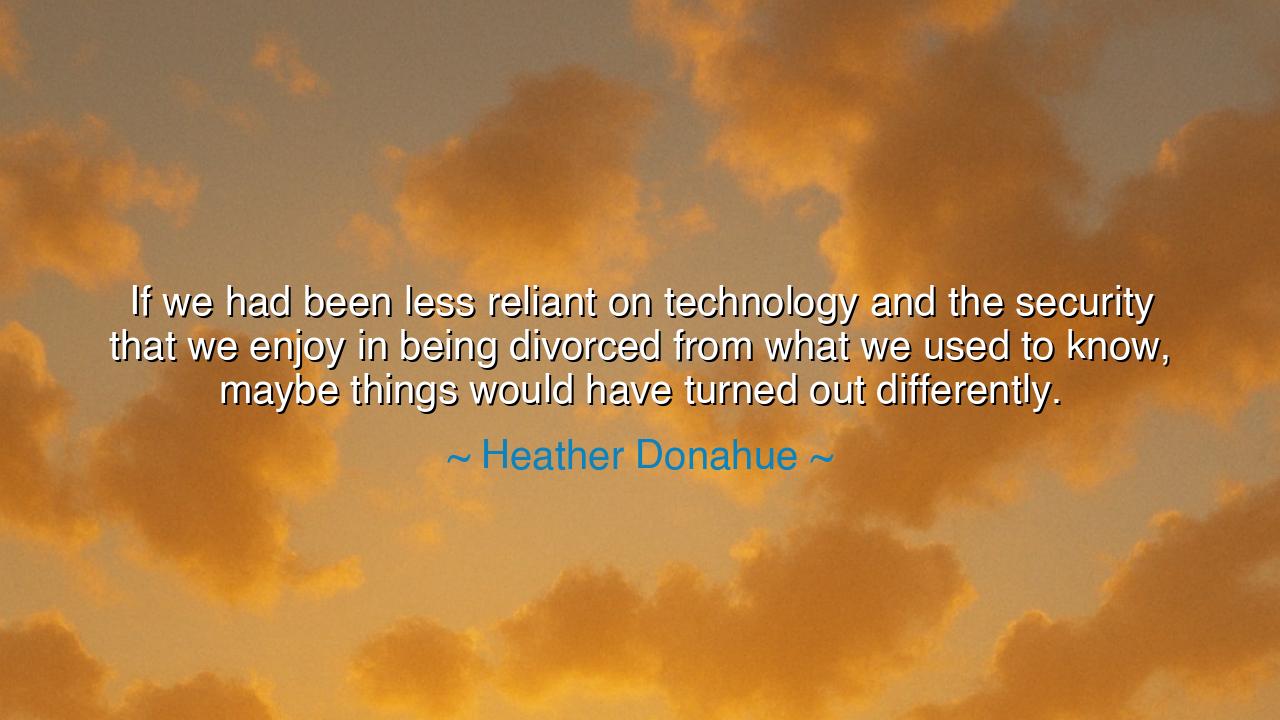
If we had been less reliant on technology and the security that
If we had been less reliant on technology and the security that we enjoy in being divorced from what we used to know, maybe things would have turned out differently.






Hear the haunting words of Heather Donahue: “If we had been less reliant on technology and the security that we enjoy in being divorced from what we used to know, maybe things would have turned out differently.” These words, drawn from the dark tale of The Blair Witch Project, are more than lines from a film; they echo a truth deeper than fiction. For in them we hear the cry of a generation that has trusted too much in its tools, forgetting the ancient wisdom that once tethered us to the earth, to survival, to each other.
The origin of this quote lies in the story of three filmmakers who, armed with their cameras and devices, ventured into the woods believing that their tools would give them mastery over the unknown. Yet as the shadows grew and the forest revealed its mysteries, their reliance on technology proved hollow. Batteries died, compasses failed, cameras could not shield them from fear. What they had abandoned—the primal instincts of orientation, the old knowledge of stars, the quiet listening to wind and earth—might have guided them when their tools betrayed them. Donahue’s words thus become a lament: we are divorced from what we used to know, and in that divorce lies our peril.
This truth is as old as civilization. Consider the fall of the Roman Empire. For centuries, Rome had grown fat on its wealth, its aqueducts, its legions, and its ordered roads. But when the barbarians came and the old systems crumbled, many who dwelt in comfort no longer remembered how to live by hand, how to plant, how to endure hardship. The empire’s glory had made its people forget the older, harder wisdom. Rome’s reliance on its own structures of security dulled the instincts of survival, and when those structures fell, so too did a world.
We see also a lesson in the fate of the Titanic, that mighty ship declared unsinkable. Its passengers trusted in steel, in rivets, in the pride of modern invention. Yet when the iceberg struck, what saved men and women was not technology, but the old virtues: courage, sacrifice, leadership, and endurance. The radios, the lifeboats, the engineering marvels—all were flawed. But it was the strength of human spirit, not the security of machines, that determined who lived and who perished.
Donahue’s words cut to the marrow of modern life. We have built devices that think faster than we can, machines that carry us farther than our feet, tools that speak across oceans. Yet in this abundance, we have let old skills wither. Few now can read the stars. Few can build without instructions. Few can wait in silence without a glowing screen to guard their minds from stillness. We are so secure in our divorce from what we used to know that we forget how fragile such security is.
The lesson, therefore, is one of balance. Let us not despise technology, for it is a gift and a tool. But let us not be consumed by it, nor believe it grants us invincibility. Relearn the wisdom of your ancestors. Learn to grow food, to walk with the land, to survive without constant aid from devices. Teach your children the old skills—how to listen, how to endure, how to be still. For when the light of the screen fades, it is the fire of human resilience that must remain.
So I say to you, O seekers of truth: use your tools, but do not let them use you. Enjoy your security, but never forget it rests on fragile pillars. Cultivate both modern knowledge and ancient wisdom. In times of plenty, prepare for times of want. In days of ease, practice endurance. For Heather Donahue’s lament is not only for a tale of horror in the woods, but for us all—that if we cling only to technology, and forget the old ways, then when the hour of trial comes, things may indeed “turn out differently.” But if we remember, if we blend the old with the new, then we will not only survive, but endure with strength, like the ancients before us.






AAdministratorAdministrator
Welcome, honored guests. Please leave a comment, we will respond soon